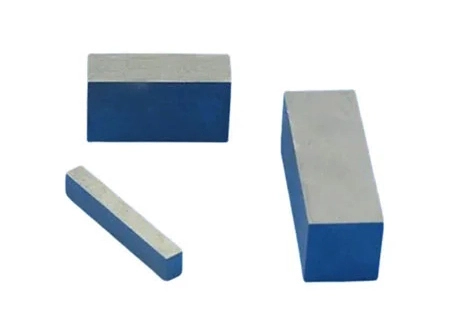Magnets find several applications in mechanical engineering. Here are some common uses of magnets in this field:
Magnetic Bearings
Magnetic bearings are used in rotating machinery, such as turbines, compressors, and high-speed motors. These bearings utilize magnetic levitation to support the rotating shaft without physical contact, reducing friction and wear. Magnetic bearings offer advantages such as high-speed operation, minimal maintenance, and improved system efficiency.
Magnetic Couplings
Magnetic couplings are used to transmit torque between rotating shafts without direct mechanical contact. They consist of two magnetically coupled parts: a driver and a driven magnet assembly. The magnetic forces transfer the torque from one part to another, allowing power transmission while providing isolation from external factors like leaks or vibrations.
Magnetic Clamping and Fixturing
Magnets are used in clamping and fixturing systems for holding and securing workpieces during machining, welding, or assembly processes. Magnetic chucks, magnetic grippers, and magnetic vices are examples of magnetic fixturing devices that provide reliable and efficient clamping without the need for mechanical fasteners.
Magnetic Lifters
Magnetic lifters are used to lift and transport heavy ferromagnetic objects, such as steel plates or components. These devices use strong permanent magnets or electromagnets to create a powerful magnetic field that holds the load securely. Magnetic lifters are commonly used in manufacturing, construction, and material handling applications.
Magnetic Separators
In industries such as mining, recycling, and bulk handling, magnetic separators are used to remove unwanted ferrous contaminants from materials. These separators use powerful magnets to attract and separate ferrous particles from the bulk material, ensuring product purity and preventing damage to downstream equipment.
Magnetic Resonance Imaging (MRI) Machines
While primarily associated with medical imaging, MRI machines involve advanced magnetic engineering. Large and powerful superconducting magnets are used to generate the strong magnetic fields required for imaging. Mechanical engineering principles are employed to design and manufacture the magnet systems for MRI machines.
Magnetic Sensors and Actuators
Magnets are utilized in various sensors and actuators used in mechanical engineering. Hall effect sensors, for example, measure magnetic fields and convert them into electrical signals, enabling position sensing, proximity detection, and current sensing. Electromagnetic actuators, such as solenoids, utilize magnets to generate a magnetic field that produces mechanical motion or force.
These are some of the applications of magnets in mechanical engineering. The unique properties of magnets, such as their ability to generate magnetic fields and exert forces without physical contact, make them valuable in various mechanical systems and processes.
The Use of Magnets In Mechanical Power Transmission Systems
"Magnets find several applications in mechanical engineering. Here are some common uses of magnets in this field:
Magnetic Bearings:
Magnetic bearings are used in rotating machinery, such as turbines, compressors, and high-speed motors. These bearings utilize magnetic levitation to support the rotating shaft without physical contact, reducing friction and wear. Magnetic bearings offer advantages such as high-speed operation, minimal maintenance, and improved system efficiency.
Magnetic Couplings:
Magnetic couplings are used to transmit torque between rotating shafts without direct mechanical contact. They consist of two magnetically coupled parts: a driver and a driven magnet assembly. The magnetic forces transfer the torque from one part to another, allowing power transmission while providing isolation from external factors like leaks or vibrations.
Magnetic Clamping and Fixturing:
Magnets are used in clamping and fixturing systems for holding and securing workpieces during machining, welding, or assembly processes. Magnetic chucks, magnetic grippers, and magnetic vices are examples of magnetic fixturing devices that provide reliable and efficient clamping without the need for mechanical fasteners.
Magnetic Lifters:
Magnetic lifters are used to lift and transport heavy ferromagnetic objects, such as steel plates or components. These devices use strong permanent magnets or electromagnets to create a powerful magnetic field that holds the load securely. Magnetic lifters are commonly used in manufacturing, construction, and material handling applications.
Magnetic Separators:
In industries such as mining, recycling, and bulk handling, magnetic separators are used to remove unwanted ferrous contaminants from materials. These separators use powerful magnets to attract and separate ferrous particles from the bulk material, ensuring product purity and preventing damage to downstream equipment.
Magnetic Resonance Imaging (MRI) Machines:
While primarily associated with medical imaging, MRI machines involve advanced magnetic engineering. Large and powerful superconducting magnets are used to generate the strong magnetic fields required for imaging. Mechanical engineering principles are employed to design and manufacture the magnet systems for MRI machines.
Magnetic Sensors and Actuators:
Magnets are utilized in various sensors and actuators used in mechanical engineering. Hall effect sensors, for example, measure magnetic fields and convert them into electrical signals, enabling position sensing, proximity detection, and current sensing. Electromagnetic actuators, such as solenoids, utilize magnets to generate a magnetic field that produces mechanical motion or force.
These are some of the applications of magnets in mechanical engineering. The unique properties of magnets, such as their ability to generate magnetic fields and exert forces without physical contact, make them valuable in various mechanical systems and processes."













